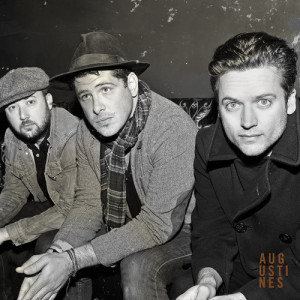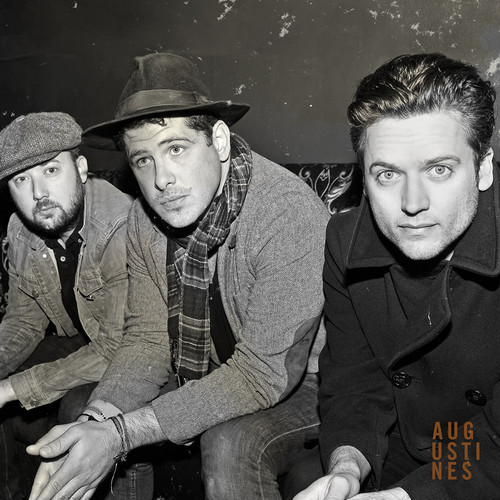
We spoke to Augustines‘ frontman Billy McCarthy (with brief but certainly valuable contributions from multi-instrumentalist Eric Sanderson and UK-born drummer Rob Allen) about the Brooklyn band’s rise to both excellence and fame with their new self-titled album and upcoming tour.
/Talk me through the name changes from ‘Pela’ to ‘We Are Augustines’ to ‘Augustines’ – are there particular reasons for each shift?
BM- Well Eric and I played in a Brooklyn band called Pela that broke up in 2009. We had just begun writing a record that was never finished. We decided to call ourselves Augustines and finish our record because it’s not like us to just give up on something we believe in. About a month before releasing it, we were contacted and forced to legally change our name, it was painful but we added “We Are” and it all happened, our band took off but again, we believed in our vision and never gave up on it, and those people finally allowed us our name back. So here we are.
/ ‘You Are Free’ premiered via Rolling Stone, you’re booked to play your biggest ever UK date in April – was there always an expectation with the kind of emotionally connected music you make that the mainstream would come knocking?
BM – I think when you’re really living your music day to day, you’re in a bubble. I think of the old jazz guys that lived in Harlem, they just carried on not really knowing who and where their records were selling, they were just enthralled in their music life in NYC. I’m sure they were tickled that people cared about what they did around the world but they would’ve played regardless of any mainstream attention I think. We are probably similar, we adore the process of making music and our friendship, it’s really lovely people care about what we are doing, it really touches us. It’s from our heart and I know we’d do it no matter the circumstances.
/ Do you have ambitions towards being a ‘big’ band? Are you believers in the idea that the more people are exposed to your work the better?
BM – Honestly we’ve never put much thought into it, we actually get the most excited about being good at it, doing strong work.
/ ‘Rise Ye Sunken Ships’ was one of the best albums of 2012 – when did you understand that you had something special on your hands? How do you feel about that record looking back?
BM – Again the bubble thing, Eric and I were just determined for many personal reasons to not give up. It really became this entity that wasn’t about music anymore. We’d talked about some fairly intense subject matter on the record, and we just wanted to get it out to the world because it seemed so unfair that it’d perish. I think I had a moment when we first did David Letterman. He said some very out of character and kind things on the show about us. I think we were all a little stunned. Since then I’d say the emails and conversations we’ve had with fans, were pretty heart warming and I kind of knew it wasn’t normal. These conversations were really tender and truthful. It didn’t feel like a pop band or flavor of the month feeling. We were connecting with people.
/ Were you intimidated at the idea of following up an album like that?
BM – Sure. Definitely. But being creative guys we knew it was just about searching and digging deeper. Reconnecting.
/ I’ve only heard the new album a couple of times but it seems to sound even more cinematic, more “widescreen” than ‘Rise’ – were you purposely trying to push the envelope in terms of scope?
BM – I’d say that in comparison to now, we hadn’t seriously toured before “Rise”. We were just getting by in New York. On the new record, the road was so fresh in our mind. So many countries and faces we’d seen. Just the feeling of it, the ache, the joy the longing we felt traveling. All of those feelings were put into the new record.
/ ‘Weary Eyes’ touches on the themes of addiction and the bar life that were so prevalent on ‘Rise’ – are these things that are still at the front of your mind when you write?
BM – Sometimes when I ride the subway I imagine everyone on the train one by one as royalty. I’ve done this for some reason since i was a boy. So a man from Haiti becomes a king with royal garb and a crown, a destitute woman becomes a queen dressed in full regalia, a Muslim cab driver becomes a prince etc. I think the reason I do this, is because I do not always believe what I’m seeing. A run down woman down on her luck, a fatigued cab driver, a struggling single parent on their way to work etc. . People are far more complex than they look, far more depth and beauty than we see. I admit I get enthralled in the interior of human beings and how ones soul resides within this sort of day to day pedestrian exterior fairly invisible to the world. So i like to observe those characters at the bar that at times seem like they’ve “ended up” in this place in life, but I’m more interested in what they perhaps wanted to be when they were a child, who was their first kiss and what their dream was. I like to give a little dignity to characters that have lost some or are invisible.
/ What happened to the band, and to you individually as people when you saw the popularity of ‘Rise’ and the kind of dedication you were getting from your fan base?
BM – It had its moments of elation and definitely fatigue. But it has certainly cemented a beautiful bond amongst us a friends and collaborators and the adventure of all of this is pretty inspiring. I can walk away knowing we did the right thing by continuing and we did it on our terms.
/ The key difference lyrically between this record and ‘Rise’ – is it that the characters here have a future, they’ve got hope? Are you feeling more hopeful now?
BM – Yes I am. I still have my days where I feel a little shy about believing in all of this because it’s a pretty brutal business. But I do feel that no one can ever take from me that this finally happened. When we sold out Shepherds Bush Empire last record, it truly was just 2 calendar years after Eric and I were touring playing acoustic guitars sitting on stools begging our boss for time off to tour. Very inspiring stuff.
/ Tell us a little bit about the idea of the ‘Walkabout’ – is this an ongoing journey? Are you still looking for answers or do you feel like you know the score now?
BM – Well that’s a great question. My personal walkabout has been about wrestling with the way life was for me and this new opportunity to make change. But the problem is that I don’t feel at home anywhere, nor am I in any one place very long. I find myself feeling alone traveling, and I find myself a bit alone in NYC, this place that has been ruthless at times. The truth is this traveling life is so uncommon, and it can feel very alien at times. So what does one do when their dream comes true? Where do they go? Whom do they celebrate it with? All their new friends or their beloved old friends that have long since stopped chasing their dreams? I’m wrestling with all of that still.
/ Billy, you use your voice in a whole new way on the song ‘Walkabout’ – a challenge or something that came naturally? And why pull out the falsetto for that particular track?
BM – I dunno to be honest. I think it just sounded pretty to me. I’d say it came out naturally. I didn’t realize it was different really.
/ Billy, your journey through Kenya, Turkey and through the outer reaches of America wound up with you heading back to your elementary school. What happened there? Do you think there’s a logic to coming full circle in that way?
BM – Absolutely. I’ve found myself over the years thinking about this music room I first sang in choir in as a little boy. I must’ve been 10 or so. It had this light from the windows and a piano, it was a musky room with high ceilings. I remember how peaceful I felt there, and throughout my life I’ve returned there in thought as a place of inspiration. I remember playing in the playground was always fun but that I felt this profound feeling in that room. During this walkabout phase in my life last year I actually had a crazy idea. To contact my grade school to see if I could actually go play in that room! And hey let me! It was incredible while feel so lost and wrestling with myself, to go and sit and to begin writing there. That spirit carried on through the record.
/ How did this album come together – were you writing together from scratch or was there a backlog of ideas?
BM – I had been collecting ideas and thoughts as I do, but I was so busy touring with the guys I couldn’t truly sit down and do it properly. So I’d say it was both. From scratch and lyrically just from observations I’d had while traveling.
/ What’s your approach to recording? Are you fans of the ‘studio magic’ or do you prefer to capture as much live as possible?
BM – I think both. I’ve really noticed it doesn’t matter much to us how we get it captured, we just want to get it ya know? So whatever resonates at the time. No rules. I’m very proud of us that we co produced this record. It’s an accomplishment.
/ I’m curious as to who you see as influences/contemporaries. Obviously the Crooked Fingers cover on ‘Rise’ made a lot of sense – what other bands do you either feel a kinship with or maybe hear echoes of in your own sound?
BM – I’ve really noticed I’ve begun listening to music in a vastly different way than before. To me I’m sort of DJ’ing my life as a movie. More of a cinematic approach. Like this airport terminal is miserable, let’s listen to Serge Gainsborough today and walk around like it’s a film. I’m very strange about music, I made a playlist recently and I realized they were all in a pretty slow tempo. I also have found myself listening to the same song all day on repeat. I dunno hmm. I have reconnected with Sinead O’Connor lately, Uileen bagpipe stuff, African music, Jim Carroll has a song called “People who died” that I love. Gil Scott Heron is pretty amazing.
/ There’s a lengthy tour to accompany the release of this album and it seems like you’ve only just finished travelling from the last one – are you all happiest on the road?
BM -Trips to Kenya, Turkey
Not always. But until I find a home, it is my home.
/ Rob, what’s it like being the British influence in Augustines? Are you the diplomatic voice of reason?
Apart from the usual stuff, teaching the lads cockney rhyming slang and having fun conversations about our cultural differences, we joke about my unofficial position as the bands morale officer.
Being in a band brings all sorts of different pressures and support for each other is key. The Bottom line is Bill and Eric are like family to me and i’ll do whatever i can, as they do for me, to help out when times get a little tough.
/ What can we expect from the live show?
BM -3 guys that work really hard at making something special happen up there.
/ Do you have any thought-out long-term plans for the band?
BM – Not at all. Just taking it one album at a time.
/ What’s the best record you’ve heard recently?
BM – Joni and Alex “Riceboy Sleeps”
/ Who would play each of you in ‘Augustines: The Movie’?
BM – Burt Reynolds
/ Finally, Eric, I asked for questions from friends online and my favourite was from Deb Highfield who simply enquired “Eric, will you marry me?”
ES – Hey love, I have to say you left me a bit speechless here :-)
Thanks so much.
BM – Thank you so much Michael.
for more information visit www.weareaugustines.com




